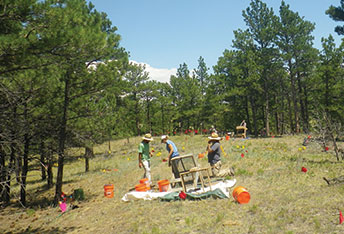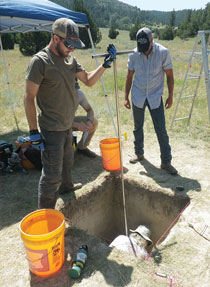
Contact Us
Institutional Communications
Bureau of Mines Building, Room 137
Laramie, WY 82071
Phone: (307) 766-2929
Email: cbaldwin@uwyo.edu
Learning While Making a Difference
September 10, 2021

Anthropology students test a prehistoric site. Courtesy photo taken at Camp Guernsey.
Students in the UW Department of Anthropology learn in the field while serving the state and nation.
By Micaela Myers
Across Europe, Asia and the Pacific lie the remains of 72,000 Americans still unaccounted for from World War II. Some were buried as unknowns, others were lost at sea, and still more are missing in action. University of Wyoming Department of Anthropology Senior Research Scientist Rick Weathermon and his students plan to head to Europe to help bring some of these servicemen and women home.
This new partnership with the Defense POW/MIA Accounting Agency is close to Weathermon’s heart. The initial trip date to begin the work was pushed back due to COVID-19, but he plans to take 13 students to Europe during the summer to begin this important project. There, they will investigate plane crash and battlefield sites.
“We’re going over there to try to repatriate those individuals back to the U.S. and their families,” he says. “Most people have pretty solid reasons to want to do this. For me, it’s wanting to return those heroes back home. Some of the students are in the military themselves. They see this as an obligation they have to follow through on.”
The partnership is one of several the department has formed to serve its students, the state and the country. Whether it’s recording cultural resources at Camp Guernsey, conducting skeletal forensic work for law enforcement or repatriating the remains of servicepeople from past conflicts, the Department of Anthropology gives students hands-on experiences while providing valuable expertise.
“The experience I gained from Weathermon and the Camp Guernsey project can be summed up in one word: invaluable,” says Adam Guinard of Powell, Wyo., who graduated in 2015 with his bachelor’s degree in anthropology and now works as an archaeologist and crew chief for Western Archaeological Services in Rock Springs, Wyo. He plans also to complete a master’s degree at UW. “The classes and instructors at UW are top-notch, especially in the realm of archaeology, but it is incredibly difficult to learn how to do fieldwork-based archaeology in a classroom setting. The Camp Guernsey project bridges that gap and allows students to have first-hand experience with professional fieldwork.”
The collaborative program with Wyoming military at the Camp Guernsey Joint Training Center in Platte County started back in 2013 with UW faculty, staff and students surveying, recording and testing archeological and historical sites. There, they’ve discovered radiocarbon dates in the 22,000-year range for pre-human material and approximately 10,000 for human material.
“The area around Guernsey is one of the largest archeological complexes in the U.S.,” Weathermon says. It includes stones that Native Americans quarried for tools and implements, such as cherts and orthoquartzites. The base itself was established in the 1930s, with many buildings built by the Civilian Conservation Corps.

Student Jack Sloan steadies the auger for instructors Rick Weathermon and Todd Surovell.
Students spend summers outside doing cultural resource surveys, site testing and excavation, collecting artifacts and writing up site narratives. “During the fall and spring semesters, we were taught how to write proprietary reports, compile research data, identify and catalog artifacts, and prepare for the next summer,” Guinard says. “Beyond building a great foundation on how to be an archaeologist, the Camp Guernsey project allowed me to make lifelong friendships, get in shape, see the beauty of Wyoming and work at some of the greatest archaeology sites the state has to offer.”
Guinard says the experience also offered personal fulfillment, an amazing mentor in Weathermon and a step up in workforce preparedness.
Another hands-on learning opportunity comes in the skeletal forensic work the department does for law enforcement and coroners across the state, dating back to the 1960s.
“We’ve carried on with this tradition up to today,” Weathermon says.
The work includes everything from historic Oregon Trail burials that are eroding to crime-scene recoveries and the dating of remains. Faculty have even served as expert witnesses.
The department engages in many partnerships around the world, furthering research and understanding while offering students unprecedented opportunities.
Three Giants in Anthropology
UW’s Marian H. Rochelle Gateway Center honors three anthropology greats.
George Gill: On Easter Island, Gill excavated and examined more than 425 prehistoric Easter islanders, providing important information relating to his theories on the peopleing of the New World. UW maintained a research connection with Easter Island since 1955 when UW anthropologist William Mulloy accompanied Thor Heyerdahl on the Norwegian Archaeological Expedition.
William Mulloy: Mulloy devoted much of his life to extensive research and restoration of the island’s shrines and monuments. He died in 1978 and willed his private collection of books, slides, maps and valuable field notes to the people of Easter Island. The William Mulloy Research Library on Easter Island is evidence of the high esteem in which Mulloy is held. Gill conducted research on Easter Island, initiated through Mulloy’s efforts and political connections, when both were faculty members at UW.
Douglas Owsley: A UW student of Gill, the Lusk, Wyo., native was honored in a 2006 issue of Smithsonian magazine as one of “35 Who Made a Difference” for his contributions in the field of forensic anthropology. Smithsonian cited Owsley’s extensive work on several high-profile cases, including the efforts to identify remains from the 1993 Branch Davidian disaster in Waco, Texas, and the Sept. 11, 2001, attack on the Pentagon. Owsley currently serves as curator of biological anthropology at the Smithsonian’s National Museum of Natural History.
Contact Us
Institutional Communications
Bureau of Mines Building, Room 137
Laramie, WY 82071
Phone: (307) 766-2929
Email: cbaldwin@uwyo.edu


